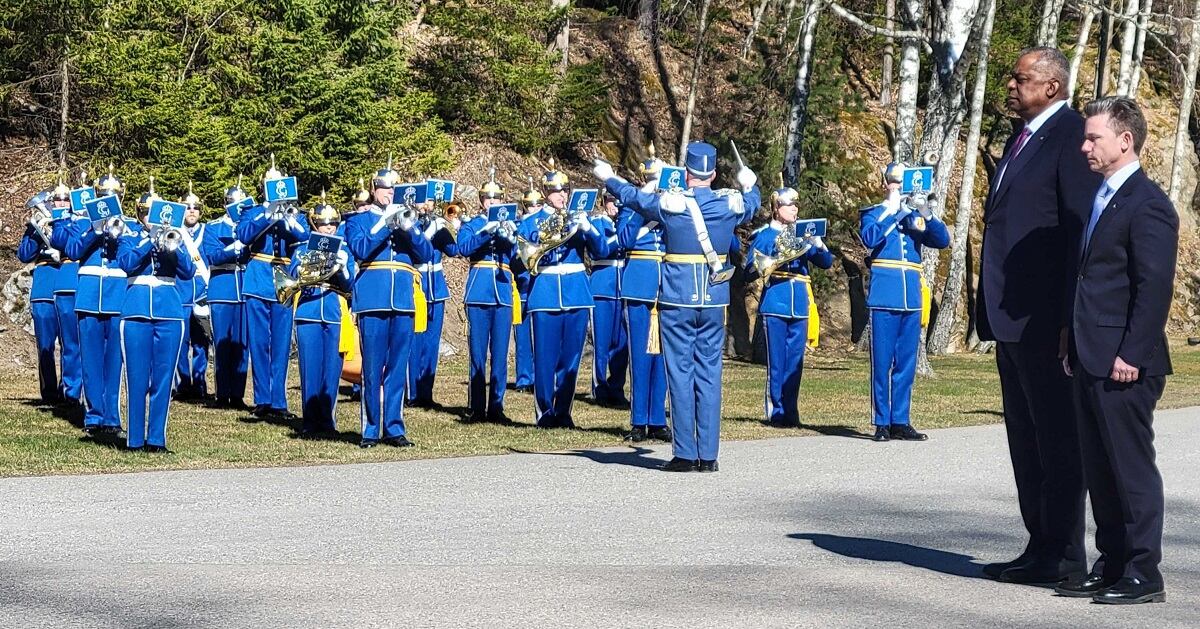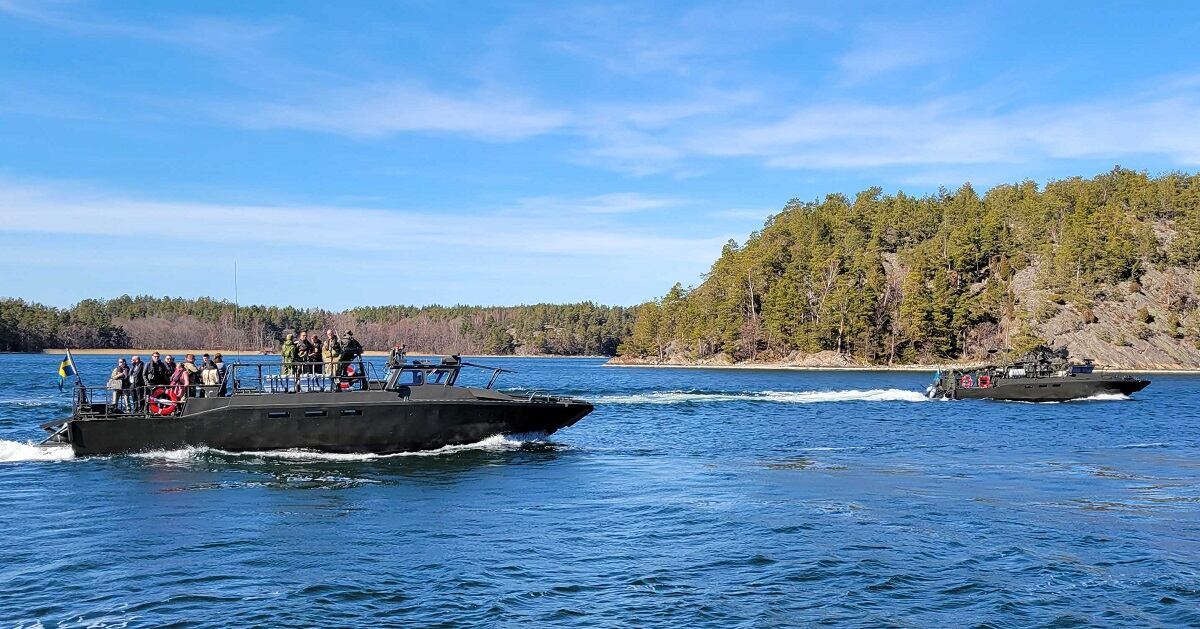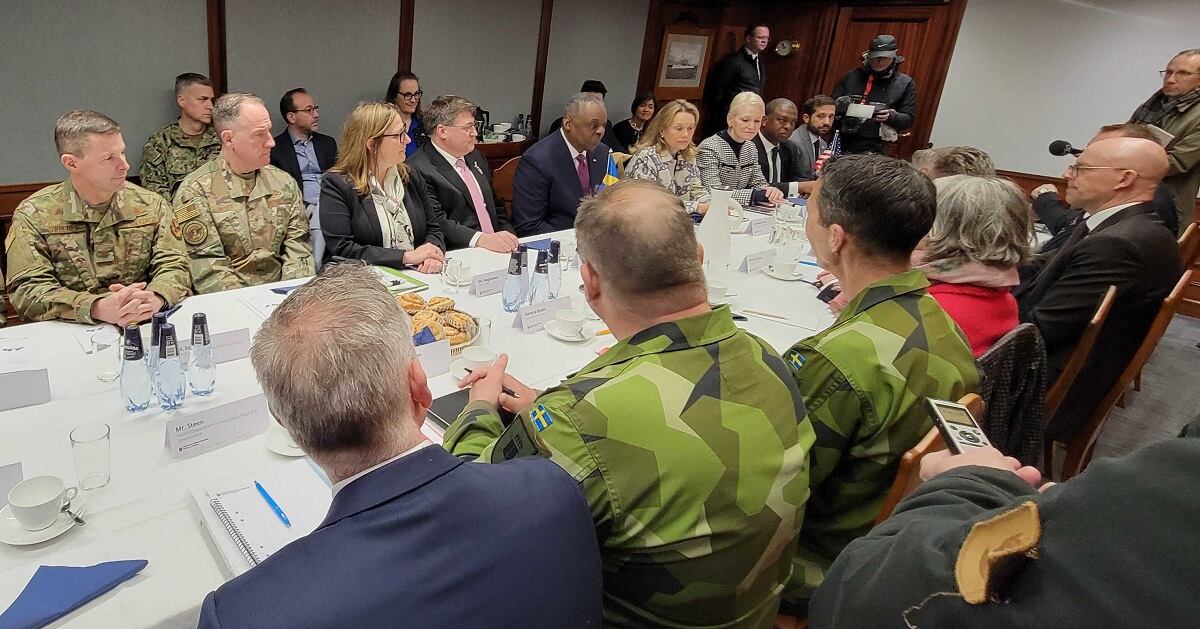MUSKӦ NAVAL BASE, Sweden — In its bid to join NATO, Sweden may cross the finish line in time for the transatlantic alliance’s next summit in mid-July, U.S. Defense Secretary Lloyd Austin said at the start of a bilateral meeting with his Swedish counterpart here Wednesday.
Sweden has lobbied for admission to NATO for nearly a year amid objections from member countries Turkey and Hungary. Many U.S. and allied officials believe its inclusion would strengthen the alliance.
Securing a spot as the 32nd ally would also offer Sweden protection under NATO’s collective defense clause, should Russia target the Nordic nation, with which it shares the Baltic Sea.
“We look forward to continuing to advocate for your swift admission to NATO, and we’ll work hard to get that done before the summit,” Austin told Swedish Defense Minister Pål Jonson.
Austin arrived in Stockholm Tuesday evening to show support for the country’s NATO application in the first leg of a four-day visit to Europe.

Austin, Jonson and Swedish defense chief Gen. Micael Bydén, among other American and Swedish dignitaries and military officials, hashed out the next steps in their military partnership from a wood-paneled conference room inside Muskö's rocky island cave complex.
After the hour-long bilateral talks, the U.S. defense secretary toured the subterranean base’s Maritime Operations Center and visited Muskö's docks ahead of a joint press conference with Jonson.
“Sweden’s membership in NATO is going to mean a stronger alliance and a more secure Europe,” Austin said against the backdrop of a Visby-class stealth corvette and an anti-ship missile system on a bright spring day in southeastern Sweden. “As I’ve seen firsthand on this trip, the Swedish armed forces are an exceptionally capable and highly professional fighting force. And Sweden’s troops and capabilities will enhance NATO’s operations to deter conflict, including in the Baltic Sea region.”
He also hailed progress toward a new defense cooperation agreement between the two countries that will allow them to forge closer ties.

Sweden already participates in several international military exercises with the United States and NATO, including the U.S. Army’s massive Defender Europe event, and is currently hosting “Aurora 23,” its largest military drill in over 25 years at more than 26,000 soldiers from 14 countries. The U.S. has supplied Sweden with military equipment for years, and both countries are part of the global effort to defeat the Islamic State group.
Austin and Jonson reiterated their support for Ukraine in its 14-month war with Russia, and pledged to continue a burgeoning rotation of U.S. Navy ships, Air Force bomber task forces and high-level visits to Sweden.
The delegation then set out on the corvette to watch Swedish naval and air demonstrations from the water.
Camouflaged marines stormed a rocky island shoreline from amphibious combat boats that fired on imaginary enemy positions with the rat-a-tat of mounted machine guns.
The convoy of boats, led by the angular, gray camouflage corvette, wound through the forested island archipelago — past a minesweeper ship and a looming black submarine, cargo ships and underwater mine blasts. Two Blackhawk helicopters buzzed the procession; a pair of Gripen fighter jets soared overhead.
It’s a glimpse of the same force that would respond if Russian warships were to sail through these waters instead.
Muskö fell into disuse in the early 2000s but returned as Sweden’s naval headquarters in 2019. Leaders hope the area’s geological advantages will help shield that core staff — and possibly ships — in case of a Russian attack. The base is also a maintenance site for ships that enter through yawning openings in the rock.

Concerns that Russia could lash out at Sweden, a longtime partner of the U.S. and other NATO countries, spurred Stockholm to seek formal membership after Russian forces launched its bloody invasion of neighboring Ukraine in February 2022.
Two holdouts remain: Turkey argues Sweden has not done enough to extradite members of what Turkey considers terror groups, among other qualms related to alleged human rights abuses and a January protest in Stockholm where a Quran was publicly burned.
Hungary is still blocking Sweden’s acceptance as well, complaining that Stockholm has criticized Prime Minister Viktor Orban’s policies.
Asked whether he’s concerned about possible aggression from Russia in the months before Sweden earns the full extent of NATO protection, Jonson said his country already feels safer after earning “invitee” status in the alliance. That allows closer collaboration ahead of the full benefits imbued by membership.
“We’re militarily more integrated … now than before,” he said. “We have received reassurances from the United States and other important partners about our security. We see a much more active exercise pattern from the United States and other countries in our vicinity, and that builds security.”
Austin declined to answer to what extent striking a deal to provide Turkey with F-16 Fighting Falcon jet upgrades has smoothed the path forward, but urged Turkish and Hungarian officials to ratify Sweden’s membership “sooner versus later” to strengthen the alliance.
“We all look forward to having a very capable Sweden sitting at the desk beside us in Vilnius,” he said of NATO’s upcoming meeting in Lithuania.
Rachel Cohen is the editor of Air Force Times. She joined the publication as its senior reporter in March 2021. Her work has appeared in the Washington Post, the Frederick News-Post (Md.), Air and Space Forces Magazine, Inside Defense, Inside Health Policy and elsewhere.





